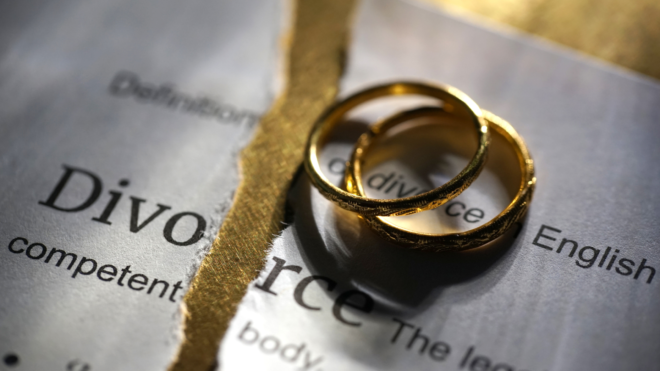The holidays are known for bringing friends and families together. But it’s also a time when divorce rates peak. If you are close to or in retirement and considering a divorce, here’s what you need to know when it comes to protecting your nest egg.
Later-in-life divorces dubbed “gray divorce” are on the rise. The 50+ crowd currently makes up a quarter of all divorces and 1 in 10 is 65+.
While divorce is difficult no matter how long you’ve been married or how old you are, if you’re divorcing after a long-term marriage, there’s a whole lot you need to know – and watch out for.
How Gray Divorce Affects Retirement
Going through a Gray divorce can severely complicate your retirement plans.
If you’re like most divorcing after a long-term marriage, you’re in your late 50’s to early 60’s and may be out of the work force (or will be soon). So you don’t have a lot of time to recover financially and protect your retirement plan if you spend a ton of money on your divorce. Yet that’s exactly what can happen if you don’t mediate and get experienced help instead.
Here, CKS Summit Group gives five key factors to consider when navigating a Gray divorce in retirement.
1. Joint Assets
There are many ways retirement will affect a gray divorce and it can depend on if you have already retired or are about to retire or if you are not financially able to retire yet. A gray divorce will likely wreak havoc on a retirement plan as income has dropped and now alimony as well as a division of assets will come into play.
Many couples have substantial net worth but little to no liquid assets. We find many gray divorcees face challenges and delays in settling their divorce because closely held businesses or more complex assets such as hedge funds or private equity holdings are complicated to split.
If you feel that your overall wealth is inconstant with high earnings, or you suspect your spouse may be hiding assets, you may want to consider hiring a forensic accountant to assist in uncovering assets.
2. Determining Alimony
The kids will likely be grown and self-supporting, so there’s probably no need for child support. But there may still be alimony involved, especially if one spouse stayed home to take care of the kids while the other earned most of the income.
Chances are the person paying alimony is late in their career. And their compensation is far more complex than when they first started out.
Things like:
- Bonuses
- Restricted stock units
- Options
- Ownership stakes
- Executive compensation packages
- Car allowances
- Travel perks
So when determining an amount of alimony in a long-term marriage, the total compensation a spouse receives needs to be taken into account. Not just their base salary. This can be a delicate issue and is best discussed and negotiated through your attorney or mediator.
3. Inheritances
When two people divorce, questions sometimes come up as to whether one spouse may claim rights to another spouse’s inheritance funds acquired during the marriage. Inheritances are actually considered “separate property” and are typically not subject to distribution in a divorce, but they can have a huge impact on your divorce settlement and finances.
Usually, when one spouse earns money during a marriage, that income is the property of both spouses. However, with inheritances, whether both spouses are entitled to part of the money will depend on a number of different and complex factors. If you are expecting an inheritance or have received an inheritance and are considering divorce, you will want to talk with a knowledgeable professional to help you protect the property.
4. Pension & Retirement Plans
So you’ve got a pension coming your way… and a divorce, too. In most all divorces, retirement accounts, along with a family home, will be the largest assets that will need to be divided.
A pension earned by one spouse is usually considered a joint asset, as are other retirement accounts, such as 401(k)s, 403(b)s and IRAs, though state laws govern the latter. Usually, whatever is earned prior to the marriage remains individual property, while what is earned during the marriage is considered a joint asset.
However, the divisions of pensions in a divorce isn’t always a cut-and-dry situation. For one, unless you are actively receiving a pension (and thus know the exact details of the payment amount and frequency), it can be difficult to pin down its exact value.
The rules relating to the division of pensions at divorce are complicated and vary from state to state and retirement system to retirement system. In addition, rights vary depending on when a divorce occurred.
For more information on pension and retirement assets in divorce, check out the Pension Rights Center fact sheets here.
5. Annuities
When it comes to splitting an annuity when getting divorced, you have a few options to consider. You can either withdraw the funds, transfer the funds to each person’s IRA, transfer ownership or start a new contract with the divided funds.
Whichever method you decide is best, be mindful that each state has its own laws when dividing an annuity. Specific regulations by the issuing company can also be found in the original contract.
Similar to a retirement account, if one person owned an annuity before the marriage and neither party contributed to it during the marriage, it will likely be considered individual property rather than marital property. If this is the case, the funds don’t need to be split.
Seeking Professional Financial Help
As you just learned, gray divorce issues are far more complex than the ones a young or newly married couple will face. And if you’re not careful, your divorce can become a financial disaster.
If all of this seems overwhelming, the retirement income advisors at CKS Summit Group can bring vast experience and objectivity to an emotionally charged situation. Contact us here today and we’ll help you get a handle on all of the financial moving parts in retirement and recommend the most beneficial strategies for you during and after your divorce.



